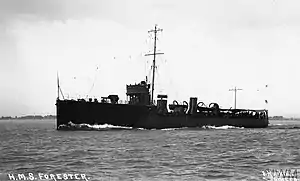 HMS Forester | |
| History | |
|---|---|
| Name | HMS Forester |
| Builder | J. Samuel White & Company, Cowes[1] |
| Launched | 1 June 1911[1] |
| Fate | Sold November 1921[1] |
| General characteristics | |
| Class and type | Acheron-class destroyer |
| Displacement | 760 tons |
| Length | 246 ft (75 m) |
| Beam | 26 ft (7.9 m) |
| Draught | 9 ft (2.7 m) |
| Installed power | 13,500 shp (10,100 kW) |
| Propulsion |
|
| Speed | 30 kn (56 km/h) |
| Complement | 72 |
| Armament |
|
HMS Forester was an Acheron-class destroyer of the Royal Navy that served during World War I and was sold for breaking in 1921. She was the ninth Royal Navy ship to be named after the traditional craft of forester.
Construction
She was built under the 1910-11 shipbuilding programme by J. Samuel White & Company of Cowes.[1] She had three Parsons turbines, and three White-Forster boilers.[2] Capable of 30 knots,[2] she carried two 4-inch guns, other smaller guns and two 21 inch (533 mm) torpedo tubes and had a complement of 72 men. She was launched on 1 June 1911.[3]
Pennant numbers
| Pennant number[4] | From | To |
|---|---|---|
| H39 | 6 December 1914 | 1 January 1918 |
| H34 | 1 January 1918 | Early 1919 |
| H58 | Early 1919 | 9 May 1921 |
Career
Pre-War
Forester served with the First Destroyer Flotilla from 1911 and, with her flotilla, joined the British Grand Fleet in 1914 on the outbreak of World War I.[3]
The Battle of Heligoland Bight
She was present with First Destroyer Flotilla on 28 August 1914 at the Battle of Heligoland Bight, led by the light cruiser Fearless,[5] and shared in the prize money for the battle.[6]
The Battle of Dogger Bank
On 24 January 1915, the First Destroyer Flotilla, including Forester, were present at the Battle of Dogger Bank, led by the light cruiser Aurora.[7] Her crew shared in the Prize Money for the German armoured cruiser Blücher.[6]
Transfer to Third Battle Squadron
Forester was not present with her flotilla at the Battle of Jutland on 31 May 1916. She was one of seven destroyers to go with the First Destroyer Flotilla when it was transferred from the Grand Fleet to screen the Third Battle Squadron in November 1916.[8]
HMAT Berrima
On 18 February 1917, 50 miles west of Portland Bill, HMAT Berrima was struck a mine in the English Channel. Four people died, but the greater part of the crew took to the lifeboats and were picked up by Forester. A tow was passed and she was taken under tow into Portland Harbour the next day. She was subsequently repaired and returned to service.[9]
Mediterranean service

From 1917 the Third Battle Squadron was deployed to the Mediterranean. Forester was present at the entry of the Allied Fleet through the Dardanelles on 12 November 1918.[10] Charles de Lacy painted Forester off Constantinople and this painting is in the Cowes Maritime Museum.[11]
Disposal
In common with most of her class, she was laid up after World War I, and on 4 November 1921 she was sold to Rees of Llanelli for breaking.[4]
References
- 1 2 3 4 Conway's All the World's Fighting Ships 1906-1921. London: Conway's Maritime Press. 1985. p. 75. ISBN 0-85177-245-5.
- 1 2 "I-class destroyers (extract from Jane's Fighting Ships of 1919)". Archived from the original on 3 June 2011. Retrieved 10 November 2009.
- 1 2 "Battleships-Cruisers.co.uk website - Acheron Class". Retrieved 10 November 2009.
- 1 2 ""Arrowsmith" List: Royal Navy WWI Destroyer Pendant Numbers". Retrieved 10 November 2009.
- ↑ "Battle of Heligoland Bight - Order of Battle (World War 1 Naval Combat website)". Retrieved 10 November 2009.
- 1 2 "An Index of Prize Bounties as announced in the London Gazette 1915 - 1925". Retrieved 10 November 2009.
- ↑ "Battle of Dogger Bank - Order of Battle (World War 1 Naval Combat website)". Retrieved 8 March 2009.
- ↑ Supplement to the Monthly Navy List (November 1916), p. 13.
- ↑ "Australian Troopships". Archived from the original on 23 July 2008. Retrieved 11 November 2009.
- ↑ S E Brooks. "The Entry of the Allied Fleet through the Dardanelles". Oxford University. Retrieved 11 November 2009.
- ↑ Art UK BBC Your Paintings website entry about this painting retrieved 9 June 2013. Museum accession 1993.59
External links
 Media related to HMS Forester (ship, 1911) at Wikimedia Commons
Media related to HMS Forester (ship, 1911) at Wikimedia Commons